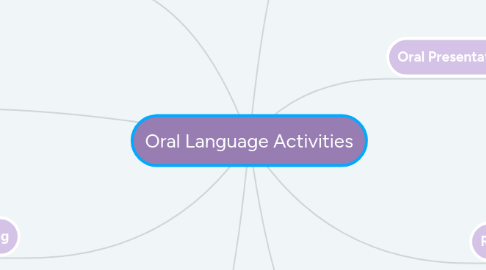
1. Create Songs or Raps
1.1. Grade Level: Secondary Students create and perform a song or rap to demonstrate their understanding of a specific topic
1.1.1. Experience: This has always been a successful and fun activity, in my experiences, but does require a lot of creativity and time.
2. Group Skits
2.1. Grade Level: All Students given creative freedom to demonstrate understanding of a subject through performing a skit as a group
2.1.1. Experience: Some teachers are happy to give this oral language activity as an option while others are more cautious, as group activities can often be seen as distracting or difficult to manage
3. Memorizing and Reciting
3.1. Grade Level: All Students are provided with material and are expected to be able to successfully memorize and recite material correctly Ex: Pledge of Allegiance, the alphabet, etc.
3.1.1. Experience: Memorization is important in many ways, but does not guarantee comprehension.
4. Question of the Day
4.1. Grade Level: All Question of the Day is provided and students are expected to participate in class discussion, including teacher, on subject matter
4.1.1. Experience: Many times you would find the same few students overpowering the conversation, while others students choose not to participate.
5. Popcorn Reading
5.1. Grade Level: All Popcorn Reading is an effective and 'fair' way to give students practice with reading aloud
5.1.1. Experience: I feel that teachers favor this method as an oral language activity, however this can be anxiety inducing for students - especially ELL students
6. Oral Presentations
6.1. Individual
6.1.1. Individual oral presentations allow for students to fully demonstrate their understanding of a topic. Oral presentations also provide teachers with the opportunity to evaluate the student's understanding of the topic by how it is presented.
6.2. Group
6.2.1. Group presentations allow for students to work together and build off of each other's strengths and weaknesses, with the goal of presenting a well-rounded understanding of the topic. Teachers are sometimes hesitant to assign group presentations, as group work can sometimes be distracting or is often distributed unfairly.
7. Reading Buddies
7.1. Grade Level: Elementary Strong readers are paired with peers who are not as successful in reading in hopes that working and reading aloud together will help build reading skills for the weaker student
7.1.1. Experience: While this peer-to-peer work can be extremely beneficial, in my experiences, it was never closely monitored by teachers, making it difficult to track progress.
8. Group Discussions
8.1. Grade Level: All; mostly Secondary Small group discussions are extremely beneficial, as it is more likely that all students have a chance to learn and participate in more manageable groups. Small group discussions also have the benefit of having learners of different levels to build off of each other.
8.1.1. Experience: Reflecting and discussing in small groups is always beneficial, however can feel like a stressor for teachers when it comes to classroom and time management

